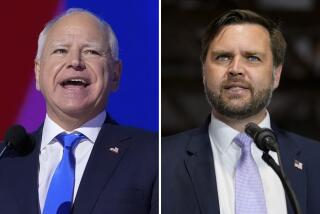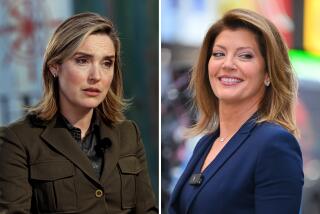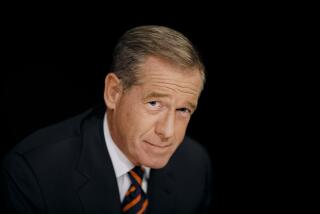Networks Limit Convention Time
WASHINGTON — ABC, NBC and CBS all plan to skip one night of live prime-time coverage during each national party convention, offering one of the skimpiest broadcast schedules for the quadrennial political events since the early days of television.
The network plans, announced Monday by ABC and CBS and last week by NBC, call for the Democratic and Republican national conventions to get minimal prime-time broadcast coverage -- essentially, a total of three hours apiece for their four-day events.
As a result, President Bush, presumed Democratic challenger Sen. John F. Kerry and their respective running mates would each receive about an hour for network coverage of their nomination acceptance speeches. Four years ago, the networks gave Bush and Democrat Al Gore 90 minutes to two hours of coverage on the final nights of their nominating conventions.
Cut from this year’s coverage plans are scheduled prime-time speeches by Sen. Edward M. Kennedy (D-Mass.) in Boston on July 27 and Sen. John McCain (R-Ariz.) in New York on Aug. 30.
The broadcast plans continue a trend in which networks have reduced convention coverage as the political parties have turned once-unpredictable events into highly choreographed coronations.
Few, if any, platform fights are expected this year at either convention. The last doubts about the roster of nominees all but disappeared last week with Kerry’s selection of Sen. John Edwards of North Carolina as his running mate.
Still, party officials are counting on greater public interest in the 2004 conventions because of the Iraq war, the Sept. 11 terrorist attacks and the nation’s stubbornly deep partisan divide. Polls show that voters are paying more attention to the presidential election than they did at a comparable point four years ago.
“We are surprised that any network would take a pass on any one of the nights of the convention,” said Leonardo Alcivar, a spokesman for the Republican National Convention. He said the networks, by declining to broadcast the GOP’s opening night, would miss not only McCain but also former New York City Mayor Rudolph W. Giuliani and “a stirring tribute” to President Reagan.
Democrats, for their part, announced Monday that they planned to showcase the late president’s son Ron Reagan in a convention speech advocating greater federal support for stem-cell research. Reagan’s family has taken up the cause in response to his long battle with Alzheimer’s disease, but the appearance of any Reagan at a Democratic event is bound to draw notice.
Acknowledging the potential importance of the conventions, network officials say they are expanding coverage in other ways to compensate for their reduced broadcast schedule. They are pouring resources into websites, Internet broadband video coverage and cable TV feeds.
“It’s a big story, a terrific story,” said Mark Lukasiewicz, an executive producer in charge of NBC’s 2004 political coverage. “Conventions are not the news-making events they once were. We all know that. But they’re still very important events, and that’s why we cover them.”
NBC plans to send anchor Tom Brokaw to Boston’s Fleet Center and New York’s Madison Square Garden. But it will also offer extensive coverage through affiliated cable channels MSNBC and CNBC and will join forces with Telemundo to reach Spanish-speaking viewers. The network also plans supplemental coverage through MSNBC’s website.
ABC and CBS announced similar plans Monday.
ABC said its anchor, Peter Jennings, would offer gavel-to-gavel coverage of the conventions through a combination of broadband Internet and broadcast TV.
CBS said it would deploy anchor Dan Rather in Boston and New York and offer “live, gavel-to-gavel webcasts of all sessions of both conventions, including all major speeches in their entirety.” PBS plans three hours of prime-time broadcast coverage each night of both conventions. PBS anchor Jim Lehrer said the network viewed extended coverage as “an important public affairs function.”
Cable TV competitors Fox News Channel and CNN on Monday outlined extensive coverage plans for the Democratic convention starting every afternoon in Boston and running into the evening. Similar coverage was expected for the GOP gathering.
Given the increasing fragmentation of the national television audience, it is unclear how many viewers would be drawn to complete broadcast network coverage. Cable TV and other media have been eating into network ratings for years. But analysts noted that TV coverage of the conventions remained a crucial part of the election year.
“These are times when Americans sit up and listen and learn at a level that they don’t ordinarily do,” said Thomas Patterson of Harvard University’s John F. Kennedy School of Government. “These are still important events even if some of their newsworthiness has dimmed in time.”
Thomas Hollihan, associate dean of the USC-Annenberg School for Communication, said, “The convention is the second most viewed event of the general election campaign -- behind the presidential debates.... People do tune in.”
Times staff writer Maria L. La Ganga contributed to this report.
More to Read
Get the L.A. Times Politics newsletter
Deeply reported insights into legislation, politics and policy from Sacramento, Washington and beyond. In your inbox three times per week.
You may occasionally receive promotional content from the Los Angeles Times.










